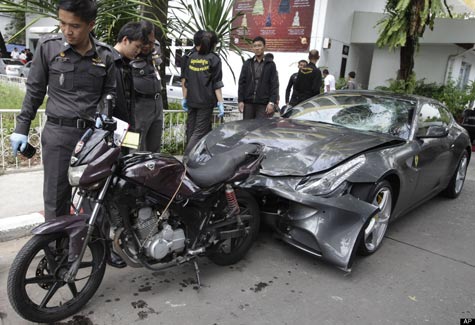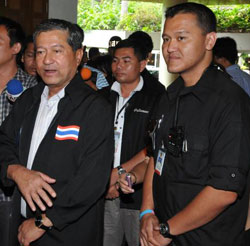
On the surface, Thailand boasts all the hallmarks of an exotic tropical idyll: white-sand beaches; dramatic limestone mountains; a languid, Buddhist lifestyle. Delve a little deeper and you’ll encounter a more troubling reality—a culture of impunity among the phu yai (literally, “big people”) who are used to having their way, often aided and abetted by corrupt elements of the police.
These bad actors bear more than a little responsibility for Thailand’s low ranking (88th in Transparency International’s most recent Corruption Perceptions Index, the same as Zambia and Swaziland), a disappointing score for a developing country with a democratically elected government.
The most recent high-profile case involves Vorayuth “Boss” Yoovidhya, 27, the grandson of the late Red Bull energy-drink tycoon Chaleo Yoovidhya. The scion of one of Thailand’s richest families, Boss was arrested in September for the fatal hit-and-run death of a Bangkok policeman. The Boss reportedly took his $1-million grey Ferrari from the family mansion out for a pre-dawn spin on Sukhumvit Road, rear-ended the motorcycle policeman, and dragged the body about 200 meters along the road before fleeing to his nearby home.
The police followed an oil trail from the leaking sports car to the Yoovidhya compound, but Boss wasn’t arrested. Instead, the superintendent of Thonglor police station, which had jurisdiction of the investigation, tried to pin the accident on the Yoovidhya family’s driver. It was only several hours later, after Bangkok’s Metropolitan Police chief went to the mansion, that Boss was finally taken into custody. His blood-alcohol was above the legal limit, but he claims he drank after the accident to calm down. After skipping several official summonses, Vorayuth finally showed at Thonglor station for police questioning in late October. His family has already paid the late policeman’s relatives nearly $100,000—or about 10 percent of the value of the Ferrari—to avoid a civil lawsuit. No date has been set for a criminal trial.
Few ordinary Thais expect that Boss will do any hard time.
Why the cynicism? Look no further than the horrific fire at Santika nightclub in the early-morning hours of January 1, 2009, an inferno that killed sixty-six people. The popular club operated in a residential area for five years without a license, despite numerous complaints by neighbors. Coincidentally, one of Santika’s major shareholders was a ranking police officer in Bangkok’s Crime Suppression Division. While Thailand can claim elite, professional law-enforcement units—the Tourist Police come to mind—too many local cops view themselves as businessmen first. It would be impossible for prostitution and gambling (both illegal in the kingdom) to flourish, or for the Russian mafia to make inroads into the tatty beach resort of Pattaya, without police collusion.
After the Santika blaze, a Ministry of Justice investigation determined the club, which had only one working exit, was licensed as a private residence and never had a fire-safety inspection. The city architect’s approval of the building’s design had also been forged. But the MoJ inquiry was soon shut down and the investigation delegated to the police—the very folks who looked the other way for years. More than two and a half years later, the club owner and the owner of a light-and-sound company accused of starting the blaze were found guilty of negligence. They each received 3-year prison sentences.

Duang, who was an Army officer, went AWOL and fled to neighboring Malaysia. He surrendered the following year and was acquitted of murder on the grounds of conflicting witness accounts and insufficient evidence. He was discharged from the army for desertion.
In 2008, then-Prime Minister Samak Sunrajev reinstated Duang into the military. Last summer, he was promoted to a new position in the Metropolitan Police Bureau. Police Lieutenant Duang is now the deputy inspector of the Bureau’s training center.
“Duang shoots very well,” said his proud father, Chalerm, without a trace of irony. “His shooting accuracy is 100 percent…there aren’t many people in Thailand who have perfect shooting accuracy.”
Christopher R. Cox has made more than thirty trips to Thailand and always managed to avoid trouble with the police. His upcoming mystery-thriller, A Good Death (Minotaur) features corruption aplenty in Bangkok’s Thonglor district.
